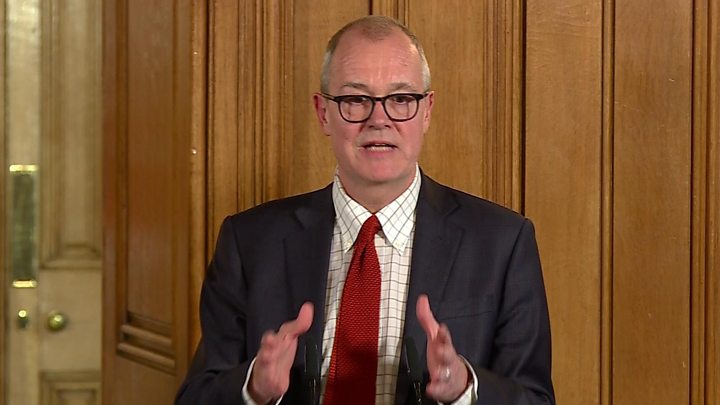Coronavirus: What is the ‘delay’ stage of the UK’s plans?

Coronavirus is spreading in the UK and a major epidemic is expected.
A worst case scenario could see 80% of people infected if nothing is done.
What is the UK now doing about coronavirus?
The UK government is attempting to delay the spread of coronavirus and reduce the epidemic’s peak (when the number of cases is highest).
It says that from Friday:
- All people with flu-like symptoms – a fever above 37.8C or a persistent cough – should self-isolate (stay at home, away from other people) for seven days
- Schools should not take trips abroad
- Older people and those with pre-existing health conditions should avoid cruises
Further measures will be taken as the number of coronavirus infections moves towards its peak:
- Everyone over 70 will be told “within the coming weeks” to stay at home for an extended period
- If someone in your home falls ill, the whole household will be told to isolate itself for 14 days
It is hoped these steps could significantly reduce the number of infections and cut deaths by up to a third.
Could schools close and public gatherings be banned?
The government has other powers it could use to protect people from infection:
- School closures and – once a new law is passed – allowing bigger class sizes if there are teacher shortages
- Restrictions on the use of public transport
- Stopping big gatherings
- Troops supporting the emergency services
- Police focusing on the most serious crimes and maintaining public order
- New legal powers to make people stay in quarantine
Some other countries like Italy have already taken some of these measures, but they tend to have more cases.
And officials in the UK have concerns about how effective they will be.
For example, while school closures could reduce the peak, forcing parents to stay at home would be a problem. It could reduce the number of health workers available, or mean grandparents – one of the at-risk groups – stepping in.
- EASY STEPS: What can I do?
- A SIMPLE GUIDE: What are the symptoms?
- MAPS AND CHARTS: Visual guide to the outbreak
- VIDEO: The 20-second hand wash
Is the NHS ready for coronavirus?
Up to one in five UK workers could be off sick during a major outbreak, the government says.
It thinks there could be more deaths, especially among elderly people and those with health conditions like heart or lung problems and diabetes.
There are 30 hospitals on stand-by to take patients, but all of the NHS is on an emergency footing.
Hospitals have plans to keep coronavirus patients separate and supply staff with protective masks and suits.
All hospital patients with flu-like symptoms are being tested.
If someone tests positive, they may be moved to one of the main hospitals, if that’s best for them.
Patients with mild symptoms are being asked to self-isolate at home. Community teams will keep an eye on them if need be.
But people are being advised not to ring NHS 111 to report their symptoms unless they are worried.
How will the NHS treat seriously ill patients?
Currently there is no treatment or cure, so hospitals are trying to relieve the symptoms.
Specialist equipment called ECMO – which helps breathing – is at five units for patients whose lungs fail.
The government wants to get more ventilators into the health system and is working with suppliers in the UK and abroad to increase the supply. It will also ask British manufacturers to help produce more ventilators in the UK “at speed”.
If there is widespread transmission, hospitals could start cancelling routine treatments to prioritise coronavirus patients.
It is estimated one in 20 patients may become critically ill, which could overwhelm the NHS. There are more than 4,000 intensive care beds, which can be increased. By how much is not clear.
Doctors warn some difficult decisions may need to be made about which patients get treatment.
What is the UK hoping to achieve?
Apart from putting less pressure on the NHS, delaying the peak to the summer could also help in other ways.
The rate of transmission may be lower in summer as more people will be outdoors.
There could also be progress in treating the illness caused by the virus.
Drugs including those used to treat malaria and HIV are being tested, while researchers are working hard to develop a vaccine.
Combined, all that should reduce the number infected and save lives.
But if the measures taken reduce cases too much, there is always the risk a second wave could hit as soon as you relax them.
If that happened next winter, it could cause real problems.
Getting the balance right is, it’s fair to say, going to be very difficult.
What questions do you have about the UK’s coronavirus plans?
In some cases your question will be published, displaying your name, age and location as you provide it, unless you state otherwise. Your contact details will never be published. Please ensure you have read our terms conditions and privacy policy.
Use this form to ask your question:
